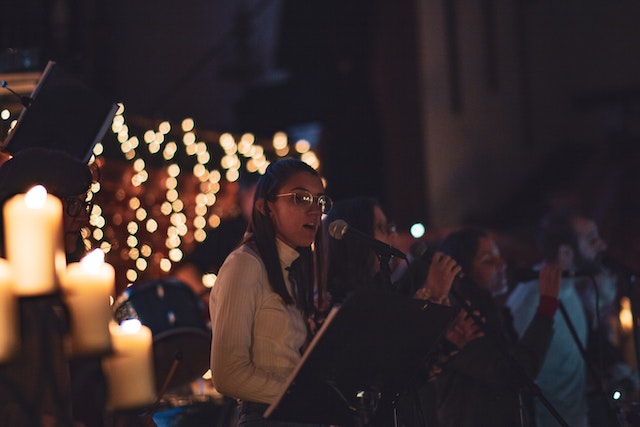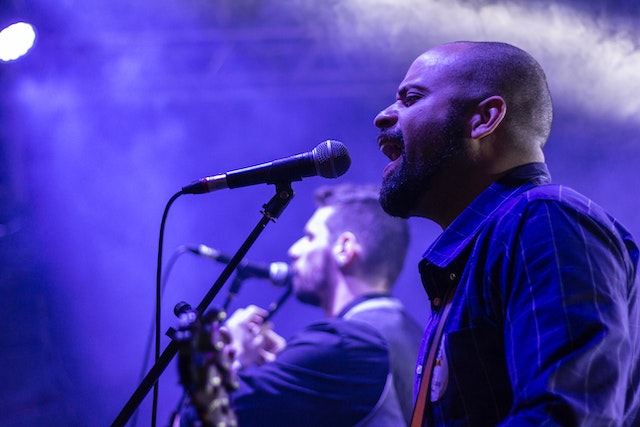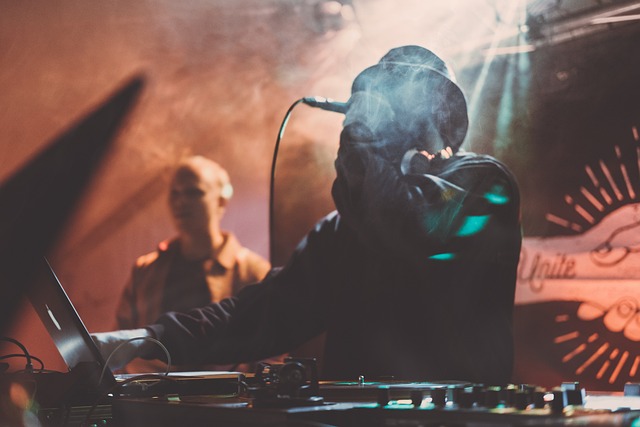BecomeSingers is reader-supported. When you buy through links on our site, we may earn an affiliate commission. Learn More
If you’re a performer struggling with stage fright, you’re not alone. Many artists experience anxiety before taking the stage, and it can be a challenging experience. However, there are practical steps you can take to transform this fear into a powerful and memorable performance.
Overcoming stage fright is totally possible with just a few tips and tricks that’ll help you deliver the performance of a lifetime. In this article, we’ll share tips and tricks that will help you conquer stage fright and deliver your best performance yet.

Table of Contents
How to sing when Nervous
To sing confidently despite feeling nervous, it helps to do breathing exercises, avoid caffeine and stimulants in general, meditate, stay hydrated, picture yourself delivering an amazing performance, and be highly prepared for your show. With a positive mindset and approach, you can deliver an unforgettable performance that even you weren’t expecting.
First and foremost is to acknowledge that stage fright is more common than people realize and that it affects many celebrities and performers like Harry Styles, Adele, and Rihanna. However, you should never let the feeling of nervousness deter you from pursuing your dreams.
The first step is to make sure you are FULLY prepared. Just like with any other art form, the best results come from thorough preparation. Make sure you know the words of your song and have a firm grasp of their meaning by practicing it repeatedly. This will allow you to concentrate on giving a moving performance rather than stressing about the details.
Second, it’s extremely important to warm up your vocal cords before you start. By loosening your muscles and expanding your vocal range with warm-up exercises, you’ll be able to sing with more ease and control. Vocal warm-ups might include anything from lip trills and tongue twisters to simple humming.
Third, close your eyes and visualize yourself singing with complete assurance, hitting every note, and receiving a standing ovation BEFORE you take the stage. Visualizing is an effective tool for controlling anxiety, so you’ll feel more certain and ready to give it your all after performing this exercise.
The fourth piece of advice, which may seem too basic, is to simply relax. Try performing mindfulness exercises and focusing on the present moment. Take deep breaths, relax your body and mind, and try not to overthink. With this technique, you can silence your thoughts and feel less anxious before going on stage.
And finally, try to keep a positive mindset and remember why you love to sing. Try to recall the excitement and pleasure you feel when you sing and the joy you give others. Remember that it’s normal to be anxious and that mistakes aren’t the end of the world.
If you’re still feeling nervous before going on stage, try shifting your attention elsewhere. Distract yourself by listening to relaxing music, talking to friends, or reading a good book.
Ways to Overcome Performance Anxiety while Singing

Keep in mind that feeling nervous before going on stage in no way reflects poorly on your singing ability or preparation for the performance. You should tell yourself again and again that if the most successful artists on the planet can feel nervous and afraid before performing, then so can the rest of us.
The good news is that there are methods to help you overcome your stage fright and give a fearless performance in front of an actual, live audience. Let’s check them out:
Preparation

If you feel unprepared for your performance, it’s natural to experience a mixture of anxiety and fear before you go on stage. You must practice your songs until they become second nature to you and no longer need conscious effort on your part. Make sure you know the song inside and out, both musically and lyrically.
Perform Breathing Exercises
Try to relax as much as you can and do some breathing exercises. If you’re sitting, place your feet flat on the floor and rest your arms on the armrests of your chair. If you’re standing, make sure your feet are about hip-width apart.
Calmly count to five while taking five slow, deep breaths. While you count to five, take a deep breath in with your nose and let it out slowly and softly through your lips.
Do this for at least 5 minutes or as long as you think is required.

Avoid stimulants like caffeine.
Caffeine, especially when consumed in large quantities, can cause over-stimulation, which can lead to a rapid heartbeat, headaches, anxiety, stomach cramps, panic, and other unpleasant side effects, all of which can work you up and make your stage fright and anxiety even worse. So try to avoid drinks like coffee, energy drinks, sodas, and teas, and try to opt for room-temperature water instead.
Convince yourself you’re excited, not scared.
Both fear and excitement stimulate the hypothalamus in the same way, leading to the same physiological response. Hormones like cortisol and adrenaline, released in response to stress, raise blood pressure and heart rate and cause rapid breathing. As your brain has a similar reaction to both anxiety and excitement, you should try to trick yourself into feeling excited about the performance.
Don’t worry about messing up, and enjoy yourself.

For singers, the fear of performing in public can cloud their ability to enjoy their art, which is extremely frustrating, especially when you’re just trying to do something you love. So just enjoy yourself, don’t take things too seriously, imagine you’re playing for your friends instead, and give yourself permission to mess up. Even the top names in the music industry aren’t immune to making blunders. Making a mistake now and then is very natural. If it happens, just laugh it off! In fact, doing so will make you appear more confident and comfortable with yourself, giving the impression that you don’t give a hoot about what the audience thinks, which is precisely what we want.
Meditate

The physical and mental advantages of regular meditation practice are significant. Meditation will help you feel less stressed, sleep better, have fewer stomach issues, and have less muscular tension, thanks to its relaxing effects. Try to include meditation in your daily schedule. You’ll feel better immediately, and the gradual reduction in anxiety will help in your eventual triumph over your stage fright.
Fixate on something or someone.
If scanning the crowd’s faces during your performance makes you anxious, divert your gaze to anything else, or concentrate on a specific person. It could be a random object in the room, a vacant seat in the back row, a dimmer on the stage’s rear wall, or the face of a friend or a family member in the audience.
If seeing a familiar face helps you relax, make that person the sole person in the audience for the entire duration of your performance. Locate what makes you feel most at ease, whether it’s an object or person. Finding what you’re looking for doesn’t take more than a few seconds.
Breakdown any other alternative methods

- Don’t eat anything for at least two hours before your performance, if not longer. That way, you won’t have to worry as much about becoming sick on stage if you start to feel nauseous right before you perform.
- Prepare your set list by starting with the easier songs in the beginning. That way, when you’re ready, you can move on to the more difficult songs, using the easy ones as “practice songs” along the way.
- Be sure to seek opinions from close friends and family members in the days, if not months, leading up to the performance. Maybe you think (or people have led you to think) that your singing skills are up to par and made you believe you can sing like Adele when, in reality, you can’t. Make it a habit to get honest opinions from those closest to you. You’ll feel a huge surge of confidence just before your performance after they reassure you that your voice is the real deal and you can put your fears to rest.
- Many public speakers and performers say that visualizing their audience naked helps them relax and feel more confident before going on stage. So feel free to try that trick.
- Keep in mind that everyone there is just looking to have a good time. They are not there to judge you, and they have no interest in your failure. So just relax and enjoy yourself.
FAQs
Can anxiety make it hard to sing?
How do I stop my voice from shaking when I sing?
At what age do singers lose their voices?
Conclusion
To sum up, it’s not easy for singers to get through performances when they’re feeling nervous and anxious. And it’s important to remember that it’s only human to become a little shaky before a big performance and that even the most experienced performers have felt the jitters before taking the stage.
However, you can overcome your fear and provide a stellar performance by adopting the correct frame of mind, warming up correctly, practicing relaxation methods, and making sure you have your whole set memorized.
Try to get some moral support from someone you trust, and most importantly, believe in yourself and your abilities as a singer. It’s possible to overcome performance anxiety and provide an outstanding, life-changing performance with hard work and determination.
So get out there, and don’t be afraid to give it your all. Don’t allow stage fright to keep you from having fun and showing everyone what you’ve got!





